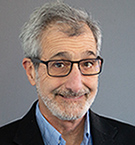During a recent semester of leave, Dr. Peter Gordon worked to develop novel theoretical and methodological approaches for understanding the coordination of language with other mental processes as to better understand why this coordination breaks down for individuals with different types of cognitive and linguistic deficits. Dr. Gordon emphasizes the coordination of language with other cognitive processes based on the belief that understanding difficulties in the performance of complex tasks, such as reading and conversation, requires an understanding of deficits in component mental processes and in how those component processes operate as a system.
Dr. Gordon worked with Shrikanth Narayanan, a Viterbi Professor of Electrical Engineering at the University of Southern California. Dr. Narayanan’s engineering background in speech science led him to a synthetic approach that considers how component processes work together in a functioning system. Most importantly, Dr. Narayanan has greatly expanded the traditional scope of speech science within engineering to include the wide range of linguistic and interpersonal factors that contribute to human communication. Dr. Gordon and Dr. Narayanan’s project aimed to increase understanding of how the coordination of component processes contribute to individual differences in reading ability and cognitive function. As skilled readers rapidly move their eyes through sequences of words, deeper comprehension of earlier words continues while encoding occurs for the word that is fixated. As a result, multiple linguistic units are processed in parallel. Dr. Gordon’s project investigates how individual differences in the ability to monitor and coordinate multiple processing streams affect performance on complex, sequential tasks. He aims to increase theoretical understanding of individual differences on reading and of deepening understanding of why tasks that require rapid responses to a series of items, most notably Rapid Automatized Naming (RAN) tasks, have been valuable tools for assessing reading skill and future literacy gains.
Initial research in Dr. Gordon’s laboratory used concurrent recordings of voice and eye movements during RAN performance as a basis for developing a preliminary eye-voice model of the coordination of language with processes of perception, memory, and motor control. Dr. Gordon and Dr. Narayanan conducted the first-ever investigations of rapid naming using methods of articulatory imaging, Real-Time Magnetic Resonance Imaging (RT-MRI) and Electromagnetic Articulography (EMA). The results produced by this research can be seen in the following video:
In addition, the use of EMA measures of articulation were combined with eye-tracking techniques to provide the first-ever multimodal images of coordinated activity in the oculomotor and articulatory systems. At a computational level, Dr. Gordon and Dr. Narayanan worked to develop a model of executive control processes during serial naming tasks. The components of the model are linked to measures of basic processes of perception, memory, name retrieval, articulatory control, and eye-movement control; the manner in which those component processes interact will be evaluated using fine-grained analyses of the dynamic patterns of the eyes and articulators during serial naming and of the eyes during normal reading. Dr. Gordon is continuing this important work with a grant funded through the National Institutes of Health.

Dr. Gordon is Professor in the Cognitive Psychology Program within the Department of Psychology and Neuroscience at UNC Chapel Hill. He studies word recognition and language comprehension, including the interaction between lexical and higher-levels of language processing and the coordination of language procession with memory, perception, attention, and motor control. Learn more about the Language, Cognition, and Brain Lab.

